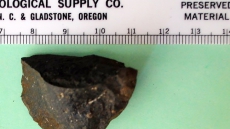MONTREAL — Julie Levenhagen was known only as "baby Agathe" when she was adopted from a Montreal hospital at nine days old.
Now, some 34 years later, and frustrated with her attempts to learn about her parentage, Levenhagen has taken to Facebook with the little information she knows: she was born July 26, 1981 at Maisonneuve-Rosemont hospital to a 22-year-old nursing assistant mother with six siblings, and a 32-year-old electrician father.
Because adoption records in Quebec are confidential, that "non-identifying" information in her file is all that Levenhagen is entitled to under the province's laws — unless her biological parents can be found and agree to be identified.
"It's really frustrating because a lot of us adoptees feel that it's our right to know where we come from," Levenhagen said. "It's an innate human need."
Levenhagen, who now lives in Arizona, filed a request with the youth centre in charge of her file last November. They in turn will try to reach her biological family and see if they consent to open the file.
So far she hasn't heard anything — not surprising, as the process can take 12 to 18 months. However, if her birth parents have died or can't be located, she is not entitled to know their names, see her adoption file, or get medical records she says could be pertinent to her health.
"My best-case scenario is that I can reconnect with family, and have more people in my life," Levenhagen said. "The worst-case is they choose not to reconnect, and if so I'll understand. But I hope I can at least get medical records, and knowledge as to what diseases, if any, run in my family."
Caroline Fortin, the president of a non-profit organization that advocates for adoptees and their families, says the province is lagging behind when it comes to updating adoption laws.
She says the current laws are the product of an era when thousands of women faced significant "religious, social and family" pressures to give up their babies for adoption. Fortin says today unwanted pregnancies are relatively rare and most children who are adopted have been seized or surrendered through social services.
Provinces including British Columbia, Ontario, Alberta, Manitoba and Newfoundland and Labrador have changed their laws to make it easier for adoptees and birth parents to access adoption records.
Manitoba's decision to unseal 75 years of adoption records in June triggered such a flood of applications that the province had to add more staff to deal with the backlog.
Quebec governments in recent years have seemed willing to tackle the issue. Both the Liberals and the Parti Quebecois introduced bills in 2012 and 2013 respectively, but neither made it to the final stages.
Both bills included provisions allowing adopted children to learn the identity of their biological parents, and vice versa, unless one of the parties were to register a "disclosure veto" stating they want their information kept private.
In June, a government-mandated committee recommended sweeping changes to the province's family laws, including repealing the confidentiality of adoption files and recognizing the right of children to know their origins.
Current Justice Minister Stephanie Vallee has said she intends to introduce a new bill to address the issue.
Vallee's spokeswoman Jolyane Pronovost said the proposed legislation is currently being prepared, but could not confirm when it will be ready to present.
Thus far, Levenhagen hasn't gotten any leads either from the Quebec government or social media, but others have been luckier.
British Columbia resident Patricia Carter finally found answers this summer after over 20 years of looking for the family that put her up for adoption in a Montreal hospital in 1966.
The request she placed through official channels was a dead end, so Carter started a public campaign that included a Facebook page, letter-writing blitz and simply talking to "anyone who would listen."
A radio interview with CBC Montreal last fall led to a breakthrough: a brother recognized Carter's original name and birthdate, and emailed to see if she might be the baby "Manon" he had been searching for.
Following a series of happy family reunions over the summer, Carter has decided to legally change her name to "Manon Patricia McGinty" to reflect her newly-discovered heritage.
The aim of her Facebook page has shifted to getting Quebec's adoption records unsealed.
"I really would like other adoptees who are unsettled and searching like I was to feel the peace I feel," she said.





